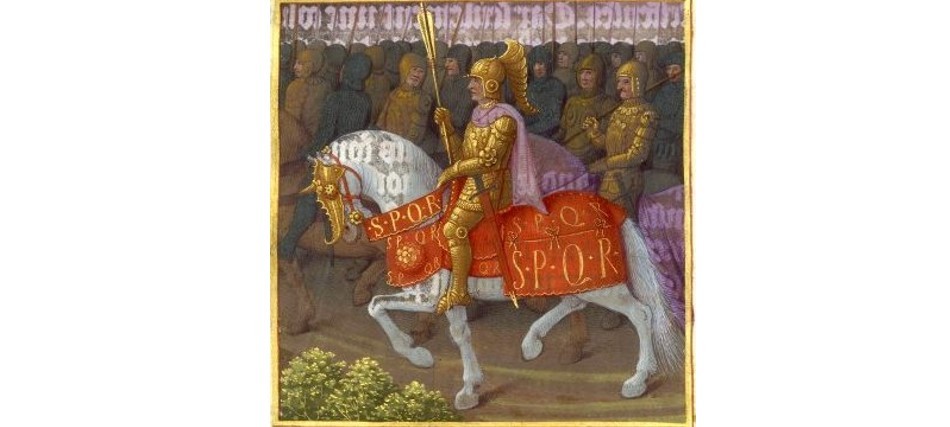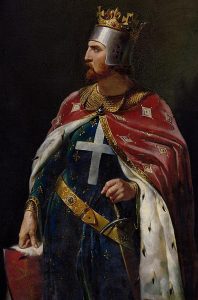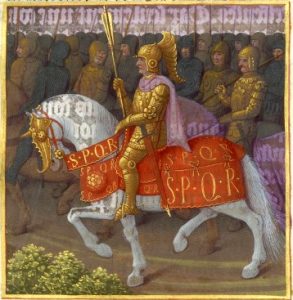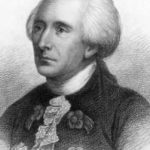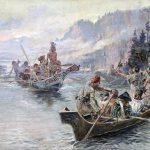History, Holidays & Observances on December 20
Today: Richard the Lionheart, South Carolina secedes, the Louisiana Purchase, Vespasian, Hitler, Sacagawea, Christmas Music,
And More . . .
Holidays and Observances on December 20
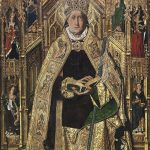 Feast of Santo Domingo of Silos, an 11th century Spanish shepherd who became a monk and a priest. After being driven out of Navarre, he ended up in the town of Silos, where he rebuilt the Abbey of St. Sebastian both physically and spiritually. After being appoint the abbot, he turned the monastery “into a center of book design, scholarship, and significant charity made possible through the proceeds of the gold and silver workshop.” He became famous for using the funds he raised to ransom Christians taken prisoner by the Muslims, After his death, both the monastery and the town were renamed for him.
Feast of Santo Domingo of Silos, an 11th century Spanish shepherd who became a monk and a priest. After being driven out of Navarre, he ended up in the town of Silos, where he rebuilt the Abbey of St. Sebastian both physically and spiritually. After being appoint the abbot, he turned the monastery “into a center of book design, scholarship, and significant charity made possible through the proceeds of the gold and silver workshop.” He became famous for using the funds he raised to ransom Christians taken prisoner by the Muslims, After his death, both the monastery and the town were renamed for him.
The Great O’s – The “Great O” of Advent (see explanation on Dec. 17) celebrated today is “O Clavis David (O Key of David)
Latin:
O Clavis David, et sceptrum domus Israel;
qui aperis, et nemo claudit;
claudis, et nemo aperit:
veni, et educ vinctum de domo carceris,
sedentem in tenebris, et umbra mortis.
English:
O Key of David and sceptre of the House of Israel;
you open and no one can shut;
you shut and no one can open:
Come and lead the prisoners from the prison house,
those who dwell in darkness and the shadow of death.
Isaiah had prophesied:
“I will place on his shoulder the key of the house of David; he shall open, and no one shall shut; he shall shut, and no one shall open.” Isaiah 22:22
“His authority shall grow continually, and there shall be endless peace for the throne of David and his kingdom. He will establish and uphold it with justice and with righteousness from this time onwards and for evermore.” Isaiah 9:7
“…To open the blind eyes, to bring out the prisoners from the prison, and them that sit in darkness out of the prison house.”Isaiah 42:7.
1192 – Richard I of England is captured and held for ransom.
Richard Coeur de Lion, probably the most romanticized figure of medieval England, was not exactly a great King of England. Richard, crowned King in 1189, was first and foremost a great Norman warlord. He saw England as a source of funding for his military expeditions.
He bled the Royal treasury dry to raise an Army to go on the Third Crusades. Once in the Middle East, Richard scored several major victories over the Muslims commanded by Saladin. But before he could complete the conquest of Jerusalem, he received word that his younger brother, John I, was conspiring to unseat him. Richard negotiated a favorable peace treaty with Saladin, then headed back to England.
Along the way, Richard’s ship crashed, and with a tiny entourage of four knights, he tried to make it home overland. On this day, Richard was captured by one his political enemies, Leopold V of Austria, who jailed Richard and demanded a ransom more than two times the entire annual budget of England. Richard’s mother raised the ransom, but England and the Church were pushed to the brink of penury.
Free again, Richard spent several more years at war before finally falling to an arrow during a castle siege. And, outside of the literary world at least, that may be Richard’s lasting significance. That by the end of Richard’s reign, there was nothing left to be squeezed from England’s piggy bank. Yet the king, Richard’s brother, John I, would try to do so by imposing taxes without the approval and agreement of his Council of Barons. They revolted, ultimately forcing King John to sign the Magna Carta in 1215.
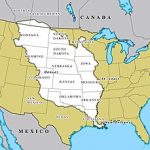 1803 – The Louisiana Purchase is completed at a ceremony in New Orleans.
1803 – The Louisiana Purchase is completed at a ceremony in New Orleans.
The Louisiana Purchase accomplished two things. It more than doubled the size of the fledgling United States and it kept Napoleon’s focus on Europe.
France and Britain, and to a lesser extent Spain, had vied throughout the 17th and 18th centuries for control of North America. Britain’s victory over France in the French and Indian War (1754-1763) drove France off the continent.. The same war left Spain in control of the vast expanse of formerly French claimed lands to the West of the Mississippi River, running North to South from the Canadian border all the way to New Orleans and West to the Rocky Mountains.
America went to war with Napoleon in the undeclared Naval War known as The Quasi War, 1798 to 1800. Thus the fledgling U.S. looked with great concern when, in 1800, Napoleon was granted title to Spain’s claim to North America and sent a French military detachment to New Orleans. In 1802, Napoleon, sent a military expedition to put down a revolution in its former possession, Haiti. The expedition failed and, with it, his dreams of expanding into North America. Shortly thereafter, Napoleon became embroiled in war with Britain.
President Thomas Jefferson, concerned about Napoleon’s intentions in North America and sensing an opportunity, ordered the American ambassador to France to negotiate with Napoleon for the United States to purchase French claims to North American territory. Ultimately, Napoleon agreed to sell the French claim to North American territory for $15 million, or about $18,000 a square mile. The treaty was signed on April 30, 1803 in Paris. The formal transfer of the land occurred on this date in New Orleans.
1860 – South Carolina secedes from the United States.
Three issues led South Carolina to secede from the United States on this date, all of which were directly or indirectly tied to slavery. Those were the abolition movement, U.S. protectionist economic policy, and whether slavery would be allowed to grow in newly added Western states, thus maintaining the political power of slave states.
Many of our nation’s Founders agreed that slavery was immoral. They supported abolition and many of them, such as George Washington, believed that changing economic conditions in the U.S. would naturally bring an end to slavery, and thus there was no need to demand its immediate end. These men planted the seeds of slavery’s end in the Constitution they wrote and the laws that they passed at the time.
But the invention of the cotton gin in 1792 changed the economics of slavery. Cotton became “king” in the south and its profitability depended on slave labor. while in the North, slavery was abolished in the years and decades following the American Revolution as the Judaeo-Christian based abolition movement took a firm hold.
The North developed a manufacturing based economy, while slavery and “King cotton” kept the south an agrarian society. Early 19th century U.S. economic policy was protectionist of manufacturing, something that helped the Northern states and burdened the Southern states that exported cotton and imported many goods from Europe. This economic policy led to the Nullification Crisis in 1832, during the administration of President Andrew Jackson, when South Carolina, championed by U.S. Vice President John C. Calhoun, argued under a theory of “state’s rights” that the state legislatures were supreme to the federal government within their own borders and had the power to declared any federal law to be unconstitutional and of no effect in their own state. The matter came close to civil war before both sides backed down.
The third point of contention arose in new states being added to the union. Many of the same men who drafted the Constitution in 1787 also passed, that year, the Northwest Ordinance, to govern the large expanse of territory west of the Appalachian Mountains and east of the Mississippi River that the United States took from Britain in the Revolutionary War. The ordinance, using language that the U.S. would eventually adopt verbatim in the 13th Amendment, prohibited slavery in the territory, setting the stage for the political conflicts that would come to a head in 1860.
It was the last issue, whether any new states admitted to the Union would be allowed to adopt slavery, that was the final straw. Slave owning states feared a loss of political power and becoming a minority in Congress. The issue drove the creation of the Republican Party in the 1850’s. Abraham Lincoln rose to prominence in the party, stating that he would not force the end of slavery, but that he was implacably opposed to allowing slavery to expand into newly admitted states.
In the Presidential Election of 1860, Lincoln won the northern and border states, which was sufficient to give him a win in the electoral college. That was enough for the politicians of South Carolina. On November 9, 1860 the South Carolina General Assembly passed a “Resolution to Call the Election of Abraham Lincoln as U.S. President a Hostile Act” and stated its intention to declare secession from the United States. On this date in 1860, the S.C. Assembly announced their secession, becoming the first state to do so.
Within three weeks, January 9, 1861, the U.S. ship Star of the West approached to resupply Fort Sumter in Charleston Harbor. Cadets from The Citadel, The Military College of South Carolina, fired upon the ship and causing it to retreat back to New York. They were the first shots of the American Civil War.
69 A.D. – The Roman General Vespasian, formally claimed the title of Emperor this day, bringing an end to the turmoil and civil war that had engulfed the empire during the Year of the Four Emperors. Vespasian established the Flavian dynasty that ruled the empire for the next 27 years.
1924 – In 1923, Adolph Hitler led an attempted coup in Germany known as the “Beer Hall Putsch.” It failed, and Hitler was jailed, taking his time in the prison to write his book, Mein Kampf. But Hitler was already a popular figure in Germany and he was pardoned by the Courts. On this date, Adolf Hitler was released from Landsberg Prison and immediately set about rebuilding the Nazi party.
1951 – The EBR-1 in Arco, Idaho becomes the first nuclear power plant to generate electricity. The electricity powered four light bulbs. In a few years, it would also become the first nuclear power plant to suffer a partial core meltdown.
1971 – The international aid organization Doctors Without Borders is founded by Bernard Kouchner and a group of journalists in Paris, France, to provide medical care in conflict zones and countries suffering from endemic diseases. By and large, its performance has been meaningful and laudable.
1987 – In the worst peacetime sea disaster, the passenger ferry Doña Paz sinks after colliding with the oil tanker Vector in the Tablas Strait in the Philippines, killing an estimated 4,000 people. The ferry was massively overcrowded, it had no radio, and all life vests were locked away.
1989 – The United States begins Operation Just Cause, an invasion of Panama aimed at removing Manuel Noriega from power and bringing him to the U.S. to face charges of racketeering and drug trafficking. The operation would successfully conclude a little over a month later and after both sides experienced light casualties when Noriega surrendered.
1995 – In 1993, Bill Clinton involved America in protecting the Muslim population of the disintegrating Yugoslavian Republic. After two years of relentless air strikes against the Bosnian Serbs, Clinton brokered the Dayton Peace Accords and, on this day in 1995, a UN Peacekeeping Force entered the country to enforce the accords.
1740 – Arthur Lee, a member of the influential Lee family of Virginia. Trained as a physician, before and during the American Revolution, as a spy and a diplomat, mostly in France and Britain. After the war, Virginia elected him to serve in the Continental Congress.
1812 – Sacagawea, the Indian guide who accompanied the Lewis and Clark expedition, serving as an interpreter, a guide, and an emissary to the Indian tribes they encountered. One rumor has it that she died this day in 1812, at age 24. Another has her surviving for another seventy years.
1968 – John Steinbeck, a prolific author most famous for his novel, The Grapes of Wrath, which, during his lifetime, sold 14 million copies.
Christmas Music
Coventry Carol is a 16th century carol that was traditionally performed in Coventry, England as part of a “mystery play” called “The Pageant of the Shearmen and Tailors.” The play depicts the Christmas story from chapter two in the Gospel of Matthew: the carol itself refers to the Massacre of the Innocents, in which Herod ordered all male infants under the age of two in Bethlehem to be killed, and takes the form of a lullaby sung by mothers of the doomed children.
Arturo Sandoval – Christmas Song
And for long Christmas listening, the Andrews Sisters
